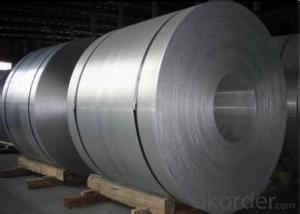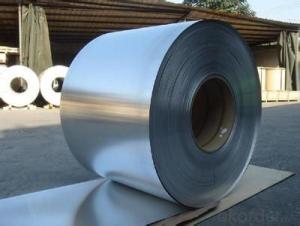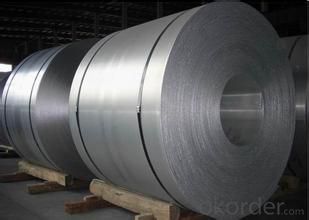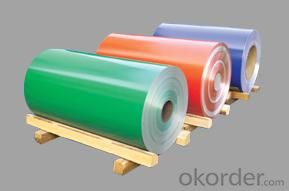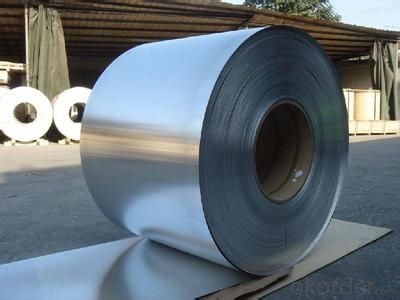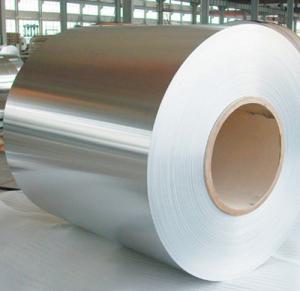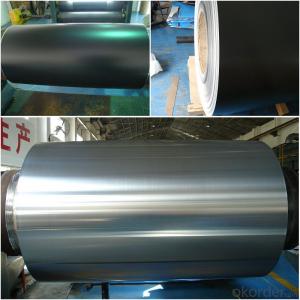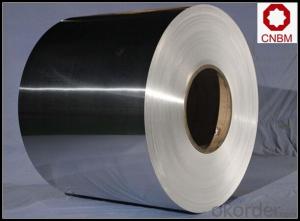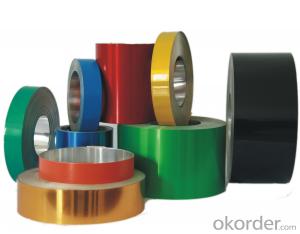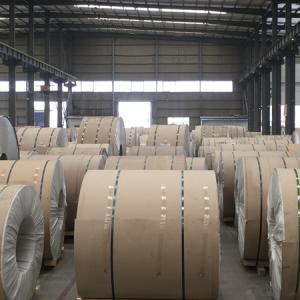Coating Aluminum Coils - Alu Roll, Mill Finish and Coated
- Loading Port:
- China Main Port
- Payment Terms:
- TT OR LC
- Min Order Qty:
- -
- Supply Capability:
- -
OKorder Service Pledge
OKorder Financial Service
You Might Also Like
Aluminium is a relatively soft, durable, lightweight, ductileand malleablemetalwith appearance ranging from silvery to dull gray, depending on the surfaceroughness. It is nonmagnetic and does not easily ignite. A fresh film ofaluminium serves as a good reflector (approximately 92%) of visible lightand an excellent reflector (as much as 98%) of medium and far infraredradiation. The yield strength of pure aluminium is 7–11 MPa,while aluminium alloys have yield strengths ranging from200 MPa to 600 MPa. Aluminium has about one-third the densityand stiffness of steel. It is easily machined,cast, drawn and extruded.
Aluminium alloys (or aluminum alloys; see spellingdifferences) are alloysin which aluminium(Al) is the predominant metal. The typical alloying elements are copper, magnesium,manganese,silicon,tin and zinc. There are twoprincipal classifications, namely casting alloys and wrought alloys, both of which are furthersubdivided into the categories heat-treatableand non-heat-treatable. About 85% of aluminium is used for wrought products,for example rolled plate, foils and extrusions.Cast aluminium alloys yield cost-effective products due to the low meltingpoint, although they generally have lower tensile strengthsthan wrought alloys. The most important cast aluminium alloy system is Al–Si,where the high levels of silicon (4.0–13%) contribute to give good castingcharacteristics. Aluminium alloys are widely used in engineering structures andcomponents where light weight or corrosion resistance is required
Specification:
Alloy: AA1050, 1060, 1100,AA3003, 3005, 3015, 5052, 5754, 5083,8011, etc
Temper: H14/16/18/22/24/32,HO etc.
Thickness: 0.2mm—100mm
Width: 100mm—2300mm (Can be slitted)
Inner Diameter:508MM
Coil Weight:500kg-3000kg(Max.)
Application:Foil stock, Circles, Roofing, Can stock, Marine plate,Anti-slipery purpose in vehicles, packing and appliance.
Features:
1. Excellent quality of products
2. Quick delivery
3. Best service to clients
4. BV,SGS avalible
5. No buckle o waveness
6. Tension leveling
7. Certificate of Origin
8. Form A,E
Packaging Detail:
Carton ,Woodenpallet with plastic protection packing ,standard seaworthy packing or as yourrequest.
Production Capacity:
AnnualProduction capacity of 600,000 tons.
Products areexported to United States, Canada, U.A.E, Brazil, Mexico,Thailand, Vietnam,Nigeria etc, over 100 countries andregions all over the world.
Production Line:
CNBM aluminumproduction base is comprised of 18 aluminumannealers, 10 coil and foilmills, 4 continuous production lines, 2hot rolling production line and 3prepainted lines.
FAQ:
1. What is the form of payment?
Normally 30% TT, L/C
2. Type of quotation?
FOB, CFR, CIF
3. Port of loading?
Shanghai port
4. Delivery time?
30 days after client’s deposit
- Q: What are the environmental regulations concerning the use of aluminum coils?
- <p>Yes, there are environmental regulations that govern the use of aluminum coils. These regulations vary by country and region but often include restrictions on emissions, waste disposal, and recycling requirements. For instance, in the United States, the Environmental Protection Agency (EPA) enforces rules that control the release of pollutants from aluminum production facilities. Additionally, there are guidelines for the proper disposal of aluminum waste to prevent environmental contamination. Recycling regulations also encourage the reuse of aluminum coils to reduce the environmental impact of mining and production. Compliance with these regulations is crucial for businesses that manufacture or use aluminum coils to avoid penalties and ensure sustainable practices.</p>
- Q: What are some normal everyday products made from aluminum that I can use to recycle?
- Aluminum siding is large. I positioned vinyl siding on my homestead, and recycled the aluminum. the money I have been given from the the aluminum rather made siding my homestead a low-value project, and it greater beneficial the linked fee of my homestead.
- Q: This question asks for the method to calculate the volume of an aluminum coil given its size.
- <p>To calculate the volume of an aluminum coil, you need to know its dimensions: the length of the coil, the diameter of the wire, and the number of turns. The volume can be calculated using the formula for the volume of a cylinder, adjusted for the coil's shape. The formula is: Volume = 蟺 * (diameter/2)^2 * length * number of turns. Here, 蟺 is approximately 3.14159, diameter is the diameter of the wire in the coil, length is the total length of the coil, and the number of turns is the number of times the wire is wound around the coil. This formula gives you the total volume of the aluminum in the coil.</p>
- Q: I can't figure out what the metabolic role of aluminum is. Been searching for a while and can't seem to find anything concrete.If you can, please include sources. Thanks!
- I okorder /
- Q: How do aluminum coils perform under high-temperature applications?
- Aluminum coils are renowned for their exceptional resistance to heat and their ability to perform well in applications that involve high temperatures. With a melting point of approximately 660 degrees Celsius (1220 degrees Fahrenheit), aluminum coils can endure and function efficiently even when exposed to elevated temperatures. The high thermal conductivity of aluminum allows for the rapid transfer of heat away from the coil, preventing overheating and potential damage. This characteristic enables aluminum coils to effectively dissipate heat, resulting in improved thermal management and enhanced performance in environments with high temperatures. In addition, aluminum coils possess good corrosion resistance, which is crucial in situations where heat and moisture are present. The naturally occurring oxide layer on the surface of aluminum acts as a protective barrier against corrosion, ensuring the durability and reliability of the coil, even in challenging conditions. Furthermore, aluminum coils are lightweight and highly malleable, making them easy to install and integrate into a variety of systems and applications. This versatility renders them suitable for a wide range of high-temperature applications, including heat exchangers, automotive components, HVAC systems, and electrical devices. However, it is important to note that subjecting aluminum to extreme temperatures beyond its melting point can cause the material to weaken or deform. Therefore, it is essential to carefully consider the specific temperature requirements and limitations of the aluminum coil before implementing it in a high-temperature application.
- Q: I have the Samp;W Mamp;P 15 rifle and was wondering if I should oil the exterior of the rifle. The receiver material is 7075 T6 Aluminum and the finish is Hard Coat Black Anodized (specifications on website). Any advice or tips are welcome! Thanks!
- aluminum is different from steel, it does rust (oxidize) but once it does the oxidation protects it from further rust! unless freshly scratched or gouged, all aluminum surfaces are covered wit ha near-invisible layer of aluminum oxide (rust) that acts like a barrier against further corrosion. anodizing is a type of aluminum finish that strengthens the natural barrier of aluminum oxide to make it more acid resistant. no oiling is necessary to keep anodized finishes in good shape. the only stuff you have ot watch out for with aluminum is mercury. mercury will destroy aluminum beyond repair. but since the mercury bans about 20 years ago accidentally spills of mercury on your gun isn't very likely... mercuric corrosive primer soot will not damage your gun.
- Q: Is it possible to use aluminum coils as a material for insulation?
- <p>Aluminum coils are not typically used for insulation materials. Aluminum is a good conductor of heat and electricity, which makes it unsuitable for insulation purposes where the goal is to prevent the flow of heat or electricity. Insulation materials are usually poor conductors of heat, such as fiberglass, mineral wool, or plastic foams, which help to retain heat within a space or prevent the loss of heat to the environment. Aluminum coils are more commonly used in applications where heat transfer is desired, such as in heat exchangers or electrical wiring.</p>
- Q: How much cube is the 0.9mm aluminum rolling?
- This is a common problem. Anyone who had received high school education can calculate it very quickily. One way is to calculate sectional area with circular area, then times the thickness of the aluminum rolling. Another way is to use the outer diameter circular area to subtract the core area and then times the thickness of aluminum rolling.
- Q: How do aluminum coils perform in extreme weather conditions?
- Aluminum coils are known for their excellent performance in extreme weather conditions. Due to their inherent properties, aluminum coils are highly resistant to corrosion, making them ideal for use in areas with high humidity, coastal regions, and places prone to acid rain or industrial pollution. Additionally, aluminum coils have a high melting point, which allows them to withstand extreme heat without warping or deforming. In extremely cold weather, aluminum coils exhibit exceptional durability and do not become brittle like some other materials. They are capable of maintaining their structural integrity, ensuring optimal performance even in freezing temperatures. Moreover, aluminum coils have excellent thermal conductivity, making them efficient in transferring heat and defrosting capabilities, which is crucial for HVAC systems operating in cold weather conditions. In hot and humid climates, aluminum coils excel in resisting corrosion, preventing moisture buildup, and maintaining their efficiency. They are designed to withstand high humidity levels, preventing the growth of mold or bacteria that could compromise indoor air quality. The lightweight nature of aluminum coils also contributes to their ability to dissipate heat quickly, improving overall cooling performance and energy efficiency. Furthermore, aluminum coils are highly durable and can withstand extreme weather events such as hurricanes, strong winds, and hailstorms. They are designed to be robust and resistant to impact, ensuring that they can withstand harsh weather conditions without sustaining damage. Overall, aluminum coils have proven to be reliable and effective in extreme weather conditions, providing long-lasting performance and durability. Their resistance to corrosion, ability to withstand high and low temperatures, and capacity to withstand severe weather events make them an excellent choice for various applications, including HVAC systems, refrigeration units, and outdoor equipment.
- Q: How much is one ton of aluminum coil?
- The price of aluminum sheet is calculated according to the price of aluminum ingot + processing fee (aluminum plate state), and the specific price is also different according to the size and size of aluminum sheet.If you have any questions, please ask. I hope to help you.
Send your message to us
Coating Aluminum Coils - Alu Roll, Mill Finish and Coated
- Loading Port:
- China Main Port
- Payment Terms:
- TT OR LC
- Min Order Qty:
- -
- Supply Capability:
- -
OKorder Service Pledge
OKorder Financial Service
Similar products
Hot products
Hot Searches
Related keywords
